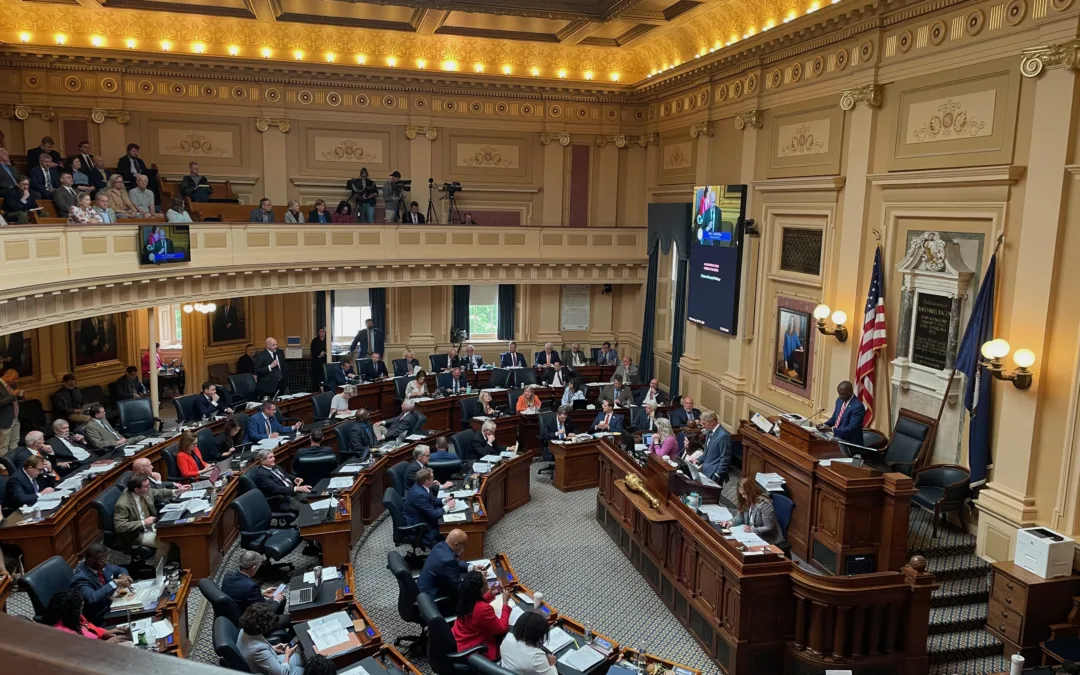
AP Photo/Cliff Owen
Youngkin claims an exit would help lower the cost of living for Virginians, but instead it will impact the commonwealth’s ability to help combat the climate crisis for years to come.
Ahead of his inauguration, Gov.-elect Glenn Youngkin announced his intention to pull Virginia from the Regional Greenhouse Gas Initiative (RGGI), a multi-state effort to reduce air pollution. The impact would have both long- and short-term effects on Virginians.
Youngkin claims an exit would help lower the cost of living for state residents, but instead it will impact the commonwealth’s ability to help combat the climate crisis for years to come. In its first year, being part of the RGGI has helped Virginia cities affected by flooding; Hampton Roads, for example, received more than $9 million in the second round of Community Flood Preparedness Fund grants, according to the Virginia Mercury.
What exactly is the RGGI?
The RGGI is an initiative of the Eastern States of the United States, which aims to help reduce greenhouse gases amongst 11 states by putting a price on the carbon emissions that are driving climate change, requires power plants to pay that price, and then channels those proceeds back to the states. According to its mission statement, the RGGI helps provide “administrative and technical services to support the development and implementation” of each state’s Carbon Dioxide (CO2) Budget Trading Program.
Virginia was the first Southern state to join the initiative, which also aims to reduce climate pollution from fossil fuel power plants. The move was considered one of Virginia Democrats’ signature successes when they took control of every branch of the state legislature in 2020 because it was one of the major pillars of their climate change plan.
The law that authorized participation in RGGI spelled out high-level priorities for funds: 50% for low-income energy efficiency programs, 45% for a new Community Flood Preparedness Fund, and 3% for the Department of Environmental Quality to oversee the participation in the RGGI and to help carry out statewide climate change planning. The remainder of the funds are for other administrative work.
Youngkin’s transition team has said leaving the initiative would save the average residential customer around $52.44 each year.
“RGGI describes itself as a regional market for carbon, but it is really a carbon tax that is fully passed onto ratepayers,” Youngkin told the Hampton Roads Chamber of Commerce, while also calling it a “bad deal for Virginians.”
Critics say the cost savings are not worth the wider benefits of staying in the initiative. In addition to not committing Virginia to help combat climate change, removing Virginia from the RGGI would especially hurt Virginians who live in communities at risk of flooding and strip funding for energy efficiency programs that help low-income families.
“Without RGGI, we lose the only source of funding for the Community Flood Preparedness Fund,” Narissa Turner, the climate and clean energy policy manager at the Virginia Conservation Network, said in an editorial featured in the Richmond Times-Dispatch.
Hampton Roads received over a third of the total of $24.5 million in flood fund awards, including one large city project designed to help reduce flooding in the region’s main business district along with residential neighborhoods in the Newmarket Creek watershed.
Can Youngkin Exit the RGGI?
Right now, it’s not entirely clear if Youngkin can pull the commonwealth from the RGGI. In the Virginia Mercury, Cale Jaffe noted that Youngkin can’t use an executive order to pull the state from the initiative because of how state laws that authorize participation are written
“The (State Air Pollution Control) Board has promulgated regulation to join RGGI,” he said. “No governor can issue an executive order to just undo a duly promulgated regulation.”
On Jan. 11, outgoing Attorney General Mark Herring issued an opinion that lays out what Virginia’s Governor can or can not do in the future, regardless of who is in office.
“It is my opinion that the Governor may not, solely through an executive order or other executive action, repeal or eliminate the regulatory requirement that electric utilities and other electricity producers hold carbon dioxide allowances that equal the amount of their carbon dioxide emissions,” he wrote.
The move to pull Virginia from the RGGI was announced less than a week after the first full cycle of Virginia’s quarterly carbon auctions had been completed, where the state earned $228 million in funds earmarked for flood protection and low-income energy efficiency programs.
Politics

Youngkin, Democrats to start over on budget talks
The Republican governor stood with Democratic leaders in the General Assembly on Wednesday in a bid to ease tensions over their budget debate....

VIDEO: Domestic abuse victims speak out against the gun law bills Gov. Glenn Youngkin vetoed
Senate Bill 47 and House Bill 46 aim to close the loophole that allows offenders to transfer their firearms to someone else instead of relinquishing...
Local News

Virginia verses: Celebrating 5 poetic icons for National Poetry Month
There’s no shortage of great writers when it comes to our commonwealth. From the haunting verses of Edgar Allan Poe, who found solace in Richmond's...

Join the fun: Recapping Family Literacy Night’s storybook adventures
When’s the last time you read a book aloud with a loved one? If it’s difficult to answer that question, then maybe it’s time to dust off that TBR...





